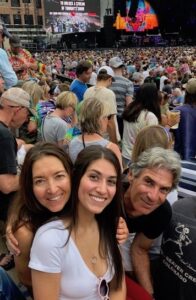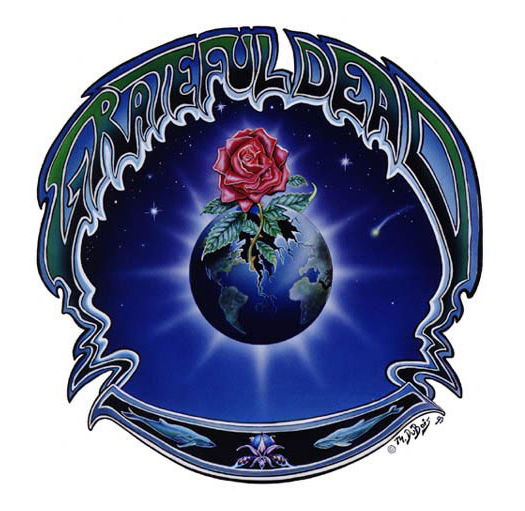Concert of the week in Grateful Dead history: January 17, 1979 (Listen Now)
And the seeds that were silent all burst into bloom and decay.
By The Deadhead Cyclist
For Week
3
The Grateful Dead rarely toured during January. After their traditional year-end multiple night stands, the band was more inclined to grab some well-deserved “R & R” than to hit the road during the first few weeks of the year. One notable exception took place in ’79, when the Dead played nineteen shows throughout the East Coast and Midwest before returning home to punctuate the tour at the good old Oakland Coliseum. Along the way was an appearance with a unique story at Veterans Memorial Coliseum in New Haven CT, on 1/17/79, my choice for T.W.I.G.D.H.
This show was originally scheduled for 11/25/78, and on that date the New Haven crowd was assembled, dosed and anticipating the first of a six-show, East Coast run when Bob Weir took the stage with a disconcerting announcement:
We got some bad news. Garcia’s real sick. Garcia’s real sick, and he has pneumonia; he’s in a respirator right now and we can’t get him out of bed. And we’re not gonna be able to play tonight, but we will be able to come back, I think maybe on Monday.
As it turned out, Monday was overly optimistic, and all six shows were canceled. Still, the band made good on their promise to come back, and then some, with an even longer tour which included stops at numerous locations not originally scheduled. Patient Deadheads in New Haven were treated to a terrific make-good show on 1/17/79.
Hearing the word, “respirator,” in the present tense, more than forty years “down the line,” evokes the story of another canceled Dead show, actually two canceled shows, in fact the cancellation of an entire tour.
In February, 2020, Dead & Company announced a seventeen-show summer tour, starting with two shows in my hometown, Boulder CO, on July 10th & 11th. For the uninitiated, Dead & Company is the most recent – and in the Deadhead Cyclist’s opinion, the most outstanding – of the post-Grateful Dead groups that have included surviving members of the band. Their annual shows at Folsom Field, on the University of Colorado campus, became a tradition for my family in 2016, when Dead & Company was the first live concert act to play Folsom Field in fifteen years. The actual Grateful Dead performed at Folsom three times – 9/3/72, 6/7/80, and 6/8/80 – adding to the mystique of Dead & Company’s revival of our local college football stadium as a concert venue.
By April, we had already lined up our tickets and were looking forward to another year of Dead concerts when the sad news arrived: Due to the COVID-19 pandemic, the entire Dead & Company tour had been canceled.
Over the course of four years and eight concerts, my wife, Mari, and I had brought numerous friends and family to the Folsom shows, including both of our daughters and several of their friends, initiating a new generation of Deadheads. There was a parental sense of joy and pride in passing along our love of the Grateful Dead and the many wonderful life principles contained within the music, the message, the community and the movement created by the band.

By any reasonable definition, a Deadhead is someone who feels a certain connection and devotion to “the music, the message, the community and the movement the band created,” independent of generation, and regardless of whether the individual ever saw the actual Grateful Dead.
We weren’t alone. The many “Old School Heads” (to borrow the name of one of the many Deadhead social media groups) attending Dead & Company shows with their kids suggests an impressive, multi-generational appeal. And yet, the debate rages as to whether those who never saw the actual Grateful Dead should be permitted the moniker of “Deadhead.”
In the immediate aftermath of Jerry Garcia’s death in ’95, I immediately took the position that there could be no Grateful Dead without him, and I’ve remained true to that viewpoint. In 2015, as the 50th Anniversary “Fare Thee Well” shows grew imminent, my voice was amplified in an article (some referred to it as a “rant”) I wrote for Boulder Weekly and the Huffington Post, which asserted that the lineup of musicians selected for the occasion was not the Grateful Dead, despite including four original members of the band. However, after attending the five-concert event I drew an important distinction between the Grateful Dead and a Grateful Dead concert, stating in a follow up piece, “It was not the Grateful Dead, simply because nothing could ever be the Grateful Dead without Jerry. But it was a damn good Grateful Dead cover band. And it was a Grateful Dead concert.”
With respect to the designation of “Deadhead,” we should be similarly generous. By any reasonable definition, a Deadhead is someone who feels a certain connection and devotion to the Grateful Dead and the band’s community of followers, independent of generation, and regardless of whether the individual ever saw the actual Grateful Dead. It’s foolish and unnecessarily stingy – indeed, very unGrateful Dead-like – to exclude on the basis of a technicality.
As the Jewish father of two daughters of non-Jewish mothers, I’ve encountered a similar folly in the thinking of the more orthodox segments of the Jewish community with respect to the Jewish identity of my children. Both of my daughters think of themselves as being Jewish, and feel a “connection and devotion” to their Jewishness – culturally, if not religiously. Yet there are those who would not consider my daughters – or any children they might have someday – to be Jewish, simply by virtue of the technicality of matrilineal descent. Isn’t the feeling of being Jewish more important than whether both of an individual’s parents were born Jewish?
The word “orthodox” is derived from the Greek word, “orthos,” meaning “rigid” or “straight.” Any true Deadhead understands that there is nothing rigid or straight about the Grateful Dead or its community. Therefore, the irony of issuing an “orthodox” denial of club membership to a new generation of Grateful Dead lovers on the basis of a technicality is glaringly obvious. Deadhead is as Deadhead does!
In the second set of the 1/17/79 show there is a fantastic version of Eyes of the World, one of the most universally loved Dead tunes. The second verse contains a message that guides us with respect to the “Deadhead” debate:
And the seeds that were silent all burst into bloom and decay.
Those who adhere to orthodoxy are well advised to adopt a more humble attitude, and understand that we are merely “seeds” that have bloomed and are in the process of decay. Such is the immutable law of nature, and we should strive to pass along that which we have found meaningful in our lives to the next generation, so that it may live beyond us.
It’s crucial that we recognize and applaud the new generation of Deadheads in the band, Dead & Company – Oteil Burbridge, Jeff Chimenti and John Mayer, the latter of whom has been the subject of undue and unfair criticism. Mayer is an incredibly talented musician who embraced the role of lead guitarist admirably, and who really gets what the Grateful Dead vibe is all about. For those looking for evidence, I offer this video of a Dead and Company performance of Cumberland Blues.
Whether our successors saw the Grateful Dead or not, and regardless of the fact that John Mayer is guilty of the high crime of not being Jerry Garcia, we should welcome them as Deadheads if they embrace and wholeheartedly adopt the ethos that infected us when we “burst into bloom.” By doing so, the music will live on, and perhaps be passed along to yet another generation. Therefore, I say: Welcome to the club!
Concert of the week in Grateful Dead history: January 17, 1979 (Listen Now)
Subscribe and stay in touch.
